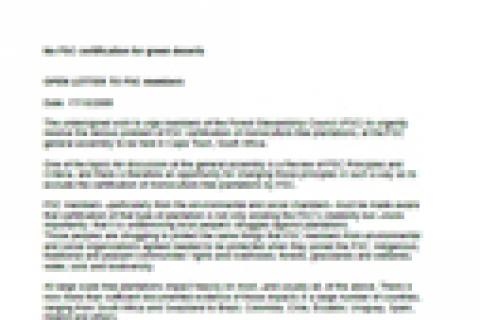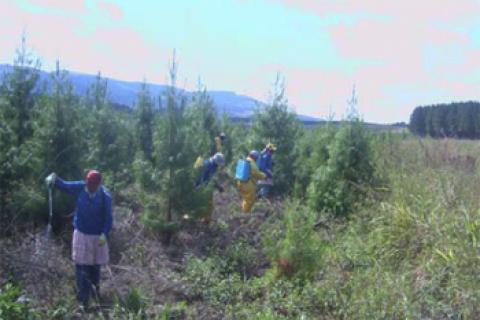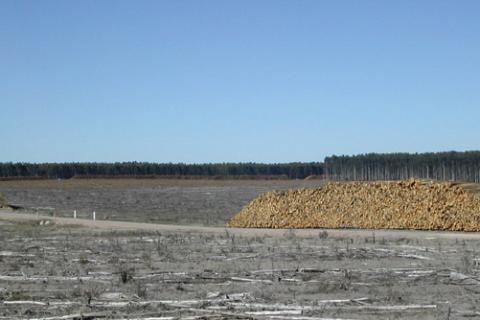Colombia is involved in the same process taking place in several Latin American countries regarding the establishment of fast-growing monoculture tree plantations.
Other information
In May 2003, we said that “In nearly all countries, large-scale monoculture tree plantations have been imposed and implemented once the laws of each country have been changed in such a way as to enable national and foreign companies to obtain all kinds of benefits, such as direct and indirect subsidies, tax breaks and even soft loans and refunds for large-scale plantations.” (See the article on Ecuador in WRM Bulletin Nº 70.)
On April 12, 2006, the report “The Kalimantan Border Oil Palm Mega-project” was released to show the plans of the Indonesian government to develop up to 3 million hectares of oil palm plantations on the island of Borneo, of which 2 million hectares along the Kalimantan-Malaysia border and 1 million hectares elsewhere --in areas still heavily forested and inhabited by indigenous communities--, to cater for international demand for cheap palm oil to meet the domestic and global demand for bio-fuel.
In May 2006, the Mozambique Ministry of Agriculture submitted for discussion the document “National Reforestation Strategy” (the complete document in Portuguese can be found at http://www.wrm.org.uy/paises/Mozambique/Estrategia_Reflorestamento.doc). As stated in the document, the bases to promote the establishment of tree plantations in the country involving fast-growing species are set out.
This August the Inter-American Development Bank (IDB) will finally catch up to the rest of the pack by putting into effect its first Operational Policy on Indigenous Peoples (OP-765). Joining the World Bank, the Asian Development Bank, the United Nations Development Programme, and numerous private banks, the IDB finally takes its place among the other international financial institutions that have adopted policies over the last decade and a half which recognize the undeniable link between indigenous peoples' rights, sustainable development and poverty reduction.
In the last decade, financial institutions and investment banks have handed out more than US$40 billion for new pulp projects in the South. Analysts expect another US$54 billion to be invested in pulp mills in the South by 2015 much of it in Brazil, Uruguay, China, the Mekong Region and the Baltic States.
Only available in Portuguese -
Introdução
O FSC-Brasil tomou a iniciativa para organizar um encontro em Belo Horizonte no dia 18 de outubro de 2005 com o objetivo de coletar contribuições para o processo global de revisão dos princípios e critérios de certificação para plantações de árvores pelo FSC.
This month WRM is launching a new occasional section to the bulletin: "Pulp Inc". The series will consist of profiles of companies involved in the pulp and paper industry.
In order to campaign effectively on the industry (and certainly before NGOs start talking about collaborating or cooperating with companies), we need to take a careful look at how the industry is structured and the nature of the companies involved in the industry: what they are and what they are not.
Only in available in Spanish -
Por Javier Baltodano - Grupo de Trabajo en la Revisión de las Políticas de Certificación a Grandes Plantaciones FSC .
Introducción:
By Ricardo Carrere -
Eucalyptus, pine, acacia, gmelina, teak, oil palm plantations have become a major social and environmental problem. From a biodiversity perspective they eliminate most local plants and provide almost no food to wildlife. Some plantation species become invasive, thus encroaching on natural ecosystems. In spite of this, they continue to be promoted, particularly in the South, for the production of cheap raw material mainly for the pulp/paper and palm oil industries.
International Women’s Day had an unusual celebration in Brazil. At dawn on 8 March, close on 2 thousand women farmers linked to the Via Campesina organization took lightening action at the facilities of the Aracruz Celulose pulp mill company in the Municipality of Barra do Ribeiro near Porto Alegre. The Barba Negra establishment is the main production unit for eucalyptus and pine seedlings to supply their Guaiba factory. It even has a laboratory for cloning seedlings.



